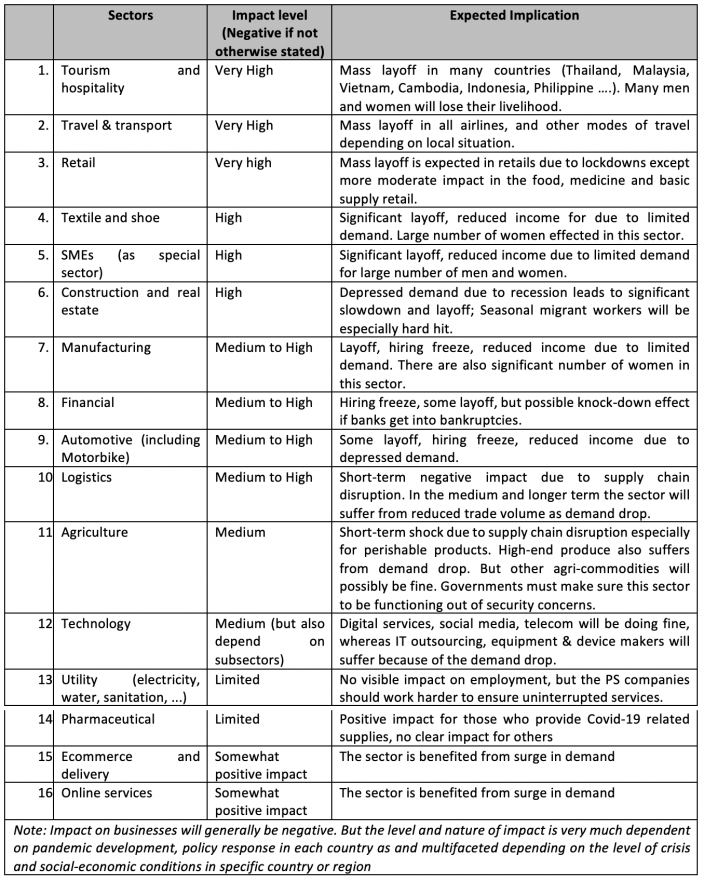The Pandemic We Are Facing
We are in the middle of a pandemic that the world has not experienced in the last 50 years. Until now, the Covid-19 spread keeps on accelerating with no signs of slowing down. It had taken 67 days from the first reported case to reach the first 100,000 cases; 11 days for the second 100,000 cases, and only four days for the third 100,000 cases”[1]. Within 3 weeks, the number of confirmed positive cases jumped from 305 thousand cases on 21st of March 2020 to 2 million cases on 14th April 2020. Health care systems in Covid-19 hotspot areas have become seriously overloaded, leading to insurmountable loss of lives.
The implication for governments, businesses and wider public are much larger than initially expected, especially if the pandemic could not be contained or slowed down in populous, so much more for less developed countries like India or Africa. Take UK for example, a research estimated that UK fatality could reach as much as 250.000[2] . The current lockdown in the UK could last for as long as 18 months to save lives[3].
Billions, not millions, of people are already under lockdown in Asia, America and most of Europe. As people stay at home, tourism and travel become frozen; value chains disrupted; consumer demand crashed; businesses closed; people's incomes lost.
ILO forecasts a rise in global unemployment. Between 5.3 million (Low scenario) and 24.7 million (High scenario) workers are in danger of losing their jobs.[4]. The forecast figure is way too optimistic as there are approximately 760,000,000 people directly or indirectly employed in travel industry alone, according to the World Tourism Organization.[5] The organization later updated its forecast on job loss from Covid-19 to 195 million, which is a full-time equivalent for the second quarter of 2020[6].
Initial wave of the spread is more painful even for more advanced & developed countries possibly due to their high connectivity. The next wave is expected now in less developed parts of the world. This situation is unprecedented. The likely scenario (but still somewhat optimistic) is that the virus might get subdued during the summer, but will drag on and re-emerge in the next season, which means the world will have to deal with the threat for the next 18 months until viable vaccine could be developed and available for public use. Most of us, if not all, possibly have not seen something similar happen in this lifetime, including the 2003 SARS outbreak, H1N1, or the 2008-2009 financial crisis. But having said that, there are some good developments showing in China and South Korea where recent reports show flattening of the curve faster than expected, which offers hope.
In the face of a global pandemic, it does not matter where you come from, what language you speak, or your cultural background. But it is the poorest that suffers from the impact the most. Coronavirus reminds us that we all deserve to be treated equally and have the same basic rights because no one can be safe unless everyone is safe. This requires solidarity to collectively tackle both public health and economic crisis.

Impact on Businesses
The worldwide lockdowns to suppress the virus will likely lead to the largest quarterly decline in economic activity since the 1933 Great Depression[7]. According to a forecast by McKinsey, in any scenario, all major economies including EU, US and China will be contracted this year. The world GDP will experience negative growth between -1.5% to -4.7%. European GDP could drop as much as -9.7% if the continent will not be able to control the pandemic, which is obviously the base case now. Negative growth could be seen in China for the first time since it opened its economy to the world more than 40 years ago. Lockdown and depressed demand will be a challenge for all countries in the world. The chances that the expected recession could become a depression are increasing as the responses so far seemed to be inadequate.
In Asia, even in the best-case scenario, sharp slowdown is expected in South and Southeast Asia as the regions are very much dependent on foreign investment and foreign markets. Hardest hit will be on many sectors that provide mass employment for both low and middle income people. The urban poor and migrant workers will be the hardest hit, including millions of women working in informal sector, in textile, shoemaking, manufacturing, as well as small businesses.
Depending on the country context, the anticipated level of impact for different sectors could be as follows:
What Should Companies Do?
The situation will vastly differ from business to business, so the actions are very much dependent on circumstances, as well as resources and expertise available. In general, in parallel of ensuring business continuity and survival, companies especially medium size and larger businesses should:
Partner With Governments & Community to Control Crisis (including resource contribution)
[[{"fid":"879","view_mode":"default","fields":{"format":"default","field_file_image_alt_text[und][0][value]":"Oxfam in Asia - Business in Time of Coronavirus - Partnering with Governments ","field_file_image_title_text[und][0][value]":"Oxfam in Asia - Business in Time of Coronavirus - Partnering with Governments "},"type":"media","field_deltas":{"3":{"format":"default","field_file_image_alt_text[und][0][value]":"Oxfam in Asia - Business in Time of Coronavirus - Partnering with Governments ","field_file_image_title_text[und][0][value]":"Oxfam in Asia - Business in Time of Coronavirus - Partnering with Governments "}},"attributes":{"alt":"Oxfam in Asia - Business in Time of Coronavirus - Partnering with Governments ","title":"Oxfam in Asia - Business in Time of Coronavirus - Partnering with Governments ","class":"media-element file-default","data-delta":"3"}}]]
The top priority is to save lives now and flatten the curve of the pandemic. Businesses might have the capacity, resource, expertise and network needed to support the community. Each business, big and small, should think of how best they can help their communities fight Covid-19 and act accordingly. Suggestions are:
- Find ways to produce and source more sanitizers, face masks, medical supplies, tools and equipment needed to fight the virus
- Set up (together with community and government) quarantine areas, hospitals, and increase supply of essential products including food, medicines, and supplies in the affected areas
- Contribute equipment, transportation, manpower and logistics to support the pandemic control
- Develop solutions and products that fall under the area of expertise of businesses such as vaccine research & development, medicine & test kit production, robotics, safety & communication services, or mobile application development that help to control or alleviate the crisis
- Share the information and know-hows needed to save lives and control the spread of Covid-19
- Contribute resources in cash (funding) or in-kind (manpower, expertise, products, etc.) to support the community, as well as provide moral support for people on the frontlines.
There are companies that are already doing good work in this:
- Zall Smart sets up emergency hospitals; sources and donates medical supplies
- Business contributes fund and help to set up quarantine facilities in Vietnam
- AstraZeneca to donate 9 million face masks to support healthcare workers around the world in the fight against COVID-19.
- Ford, GM and Tesla to make ventilators to alleviate the shortage amid Covid-19 crisis
- Jack Ma (Alibaba) announced a donation of a total of 1.1 million testing kits, six million masks, and 60,000 protective suits and face shields to help Africa in its fight against the new coronavirus.
- Alibaba offers information crucial fin fight against global spread of coronavirus
- Cisco commits $225 million to battle coronavirus, leading tech’s fight against the pandemic
- Facebook, Microsoft to partner with WHO for coronavirus hackathon
- FPT contributes 2000 quarantine places, develops app, and donates fund to fight Covid-19
- Vietnamese Business to donate 2000 ventilators to fight Covid-19
- Japanese firm to make 15,000 ventilators to help VN’s COVID-19 response
Local businesses including smaller size enterprises can contribute too, and at times are in better positions to respond to the local needs:
- Local businessmen set up free RICE ATM for the poor in Vietnam
- What governments agencies could ask for support from local businesses (a Canadian Example)
- Coffee and messages for frontline medical staff in the fight with Covid-19
- Affordable sanitization chambers against Covid-19
- Local textile companies to produce face masks
- Households businesses to support the fights against Covid-19
Stabilize Supply Chain and Ensure Critical Supply
[[{"fid":"880","view_mode":"default","fields":{"format":"default","field_file_image_alt_text[und][0][value]":"Oxfam in Asia - Business in Time of Coronavirus - Stabilize Supply Chains","field_file_image_title_text[und][0][value]":"Oxfam in Asia - Business in Time of Coronavirus - Stabilize Supply Chains"},"type":"media","field_deltas":{"4":{"format":"default","field_file_image_alt_text[und][0][value]":"Oxfam in Asia - Business in Time of Coronavirus - Stabilize Supply Chains","field_file_image_title_text[und][0][value]":"Oxfam in Asia - Business in Time of Coronavirus - Stabilize Supply Chains"}},"attributes":{"alt":"Oxfam in Asia - Business in Time of Coronavirus - Stabilize Supply Chains","title":"Oxfam in Asia - Business in Time of Coronavirus - Stabilize Supply Chains","class":"media-element file-default","data-delta":"4"}}]]
The worldwide lockdowns have disrupted global and local supply chains, leading to halting of business operations and slowdown of economic activities, which result in: (1) Market shortages of goods & services including foods and basic services, (2) Bankruptcy of businesses especially small and medium sized companies, (3) Unemployment or reduced income for workers in value chains, such as in small retailers, manufacturing sector, agriculture, and service industry. Quickly stabilizing the supply chains not only helps businesses to stay afloat, but also secure employment for workers, at the same time, ensure critical supply of essential goods such as food and other basic commodities for the society at large.
Businesses, therefore, should:
- Conduct risk assessment and provide response to minimize the impact of the pandemic on their supply chain, especially on their SMEs suppliers or small-scale farmers/retailers
- Adjust their operations, logistics, inventory and their supply chain accordingly and in a responsive way to keep supply chain functioning
- Ensure supply of essential goods & services to the market such as foods & groceries, medical supplies, water & electricity, communication, and financial services (if they are in working in these sectors)
- Provide support needed for the supply chain actors especially to vulnerable SMEs and their workers, and small-scale farmers & retailers.
There are companies who are quickly adjusting their operations to help combat the socio-economic impact of Coronavirus:
- Unilever unveiled a 500 million-euro ($543.25 million) relief program to help its “most vulnerable” small- and medium-sized suppliers as well as provide credit to select small-scale retailers.
- VinGroup allocated VND 300 bil (USD 13 mil) to help small businesses, it also contributes funding for the research, ventilators, test kits and medical equipment to fight the covid-19
- Gojek launches income support fund for partners affected by Covid-19 slowdown
- COVID-19: Visa Foundation Commits $210 Million to Support SMEs, Emergency Relief
- Covid-19 outbreak: Govt, firms launch S$77 million package to help taxi, private-hire drivers
Unfortunately, in Asia, there are also companies and brands who do not honor its buying commitments leading to insolvency and mass layoff of low-income workers in their supply chains.
Protect Your Workforce's Safety, Livelihood & Wellbeing
[[{"fid":"881","view_mode":"default","fields":{"format":"default","field_file_image_alt_text[und][0][value]":"Oxfam in Asia - Business in Time of Coronavirus - Protect you Workforce's Safety, Livelihood & Wellbeing","field_file_image_title_text[und][0][value]":"Oxfam in Asia - Business in Time of Coronavirus - Protect you Workforce's Safety, Livelihood & Wellbeing"},"type":"media","field_deltas":{"5":{"format":"default","field_file_image_alt_text[und][0][value]":"Oxfam in Asia - Business in Time of Coronavirus - Protect you Workforce's Safety, Livelihood & Wellbeing","field_file_image_title_text[und][0][value]":"Oxfam in Asia - Business in Time of Coronavirus - Protect you Workforce's Safety, Livelihood & Wellbeing"}},"attributes":{"alt":"Oxfam in Asia - Business in Time of Coronavirus - Protect you Workforce's Safety, Livelihood & Wellbeing","title":"Oxfam in Asia - Business in Time of Coronavirus - Protect you Workforce's Safety, Livelihood & Wellbeing","class":"media-element file-default","data-delta":"5"}}]]
Depending on circumstances, there are different ways businesses could do to protect the health & wellbeing of their workers while ensuring business continuity:
- Minimize the risk of infections in the workplace by practicing social distancing, reducing physical contact, and improving access to good hygiene & sanitation
- Facilitate flexible working hours so that staff could spare time to provide care for their kids and family
- Encourage and facilitate work-from-home arrangements wherever possible by investing in required technology, and establishing adaptive procedures and best practices for working online
- Conduct risk assessment and build-up contingency plan should the pandemic worsen
- Provide material and mental support for those in need, including childcare services, counseling, paid and unpaid leave outside the normal contractual regulations.
In parallel to safety and wellbeing, businesses must do what they can to protect the livelihoods of workers. As the crisis unfolds, businesses are slowing down; some will get paralyzed, while others will fall into bankruptcy. Many workers might face tough times ahead, and could earn less in the coming months. Businesses should do all it can to mitigate the negative impact on its staff, especially on women and other vulnerable groups.
Companies should make sure that they are treating their workers beyond just complying with the laws and regulations. Decisions and actions should be made fairly and humanely, putting the securing of their workers' livelihood as top priority in the medium and longer term:
- Shareholders and senior management should take the bigger hit before considering budgetary measure for ordinary workers
- Innovate practices in a way that help companies survive, keep its workforce, and at the same time gear up for recovery
- Communicate and build consensus with its workers and labor union for labor actions. Work with other players including other companies to mitigate possible negative impact
- Work with government agencies and other stakeholders to ensure social protection, including bu not limited to medical insurance coverage, unemployment benefits, and finding alternative employment.
Rethink Your Business Model And Innovate for the People & the Planet
[[{"fid":"883","view_mode":"default","fields":{"format":"default","field_file_image_alt_text[und][0][value]":"Oxfam in Asia - Business in Time of Coronavirus - Innovate and Improve Business Models","field_file_image_title_text[und][0][value]":"Oxfam in Asia - Business in Time of Coronavirus - Innovate and Improve Business Models"},"type":"media","field_deltas":{"6":{"format":"default","field_file_image_alt_text[und][0][value]":"Oxfam in Asia - Business in Time of Coronavirus - Innovate and Improve Business Models","field_file_image_title_text[und][0][value]":"Oxfam in Asia - Business in Time of Coronavirus - Innovate and Improve Business Models"}},"attributes":{"alt":"Oxfam in Asia - Business in Time of Coronavirus - Innovate and Improve Business Models","title":"Oxfam in Asia - Business in Time of Coronavirus - Innovate and Improve Business Models","class":"media-element file-default","data-delta":"6"}}]]
The world after Covid-19 will be different from the world we live today. Businesses must not go back to ‘normal’. We have to build a better and safer world for the people and the planet.
The impact of the pandemic is hitting the wage workers, small producers and women in supply chains – who have limited resources and few protections – the hardest. Businesses stand to gain by risking and leaving no one behind, improving the quality of life of the people, and taking care of the planet. People – united by empathy – will respect, choose and be loyal to businesses that do.
This poses a fundamental question on what is the purpose of business, and how companies should position themselves for the future. What is the role of wealth? What is the true role of the private sector in society?
Here are some questions worth thinking about:
- How will the world change after Covid-19? How will society at large view the role of Private Sector in times of crisis?
- What can companies do differently to prepare for this kind and other crises, including but not limited to diseases, natural disasters, climate change, and wars & conflicts?
- What kind of innovations and investments should a company consider to better prepare itself, its employees, suppliers & partners, as well as the communities they are operating in for future crises?
At Oxfam, we believe in a dynamic and innovative private sector that could contribute to and share the responsibility on solving global challenges posed by inequality, climate change, and other foreseeable and unforeseeable disasters; We believe in the power of the Private Sector to be agile and inclusive, exceling in bringing benefits not only to its shareholders, but also to the very people behind their successes —the men and women working in their organizations, supply chains, and the people living in the communities they operate in. Let this kind of solidarity bring lasting purpose and purposeful meaning for the private sector in the new era. ###
[1] https://www.nytimes.com/reuters/2020/03/23/sports/olympics/23reuters-health-coronavirus-who.html
[2] https://www.imperial.ac.uk/news/196234/covid-19-imperial-researchers-model-likely-impact/
[3] https://www.thesun.co.uk/news/11188699/260000-brits-die-coronavirus-without-drastic-measures-shutdown/
[4] https://www.ilo.org/wcmsp5/groups/public/---dgreports/---dcomm/documents/briefingnote/wcms_738753.pdf
[5] https://www.traveldailymedia.com/436871/#:~:text=1%20in%2010%20people%20in,figure%20equal%20to%20approximately%20760%2C000%2C000.
[6] https://news.un.org/en/story/2020/04/1061322
[7] https://www.mckinsey.com/business-functions/strategy-and-corporate-finance/our-insights/safeguarding-our-lives-and-our-livelihoods-the-imperative-of-our-time?cid=other-eml-alt-mip-mck&hlkid=5946e770c63545a79fb91c15f4ace988&hctky=10147472&hdpid=982bb15c-59cd-4b5a-a09f-cb5538219b01



